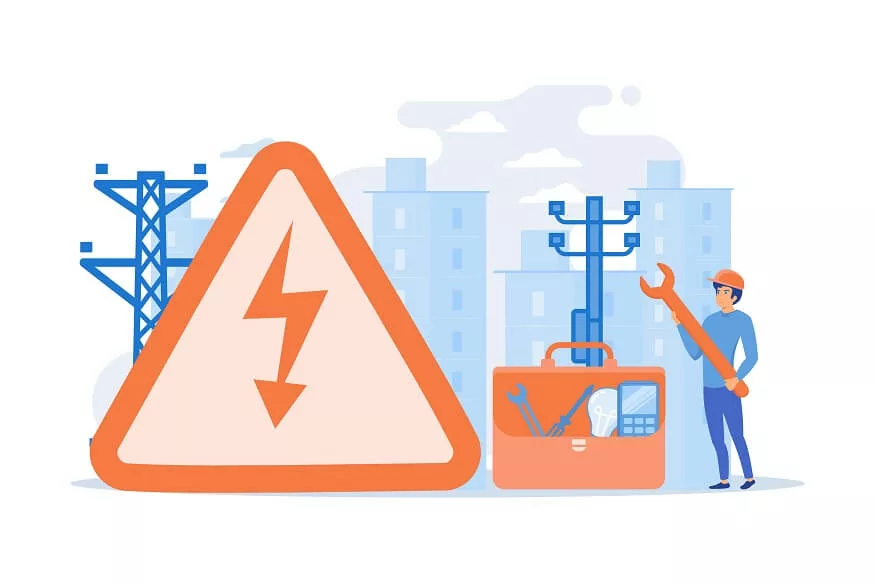Electricity is an important part of the current world, supplying electricity can provide numerous benefits and comforts. It is important to be aware of the possibilities of risks and take the required actions to check the safety of your people and property. This blog will cover everything from understanding the fundamentals of electrical systems to practical recommendations for avoiding electrical safety at home.
1. Understanding Electricity:
Before diving into electricity safety measures, it’s important to grasp the basics of electricity. Electricity is the flow of electrons through conductors like wires. In your home, it’s delivered from a power plant through power lines and enters your house via a service drop. From there, it is distributed through your electrical panel to various outlets and appliances. Understanding the components of this system is the first step in ensuring electricity safety.
Outlets and Receptacles
Outlets and receptacles are where you plug in your devices and appliances. They consist of hot wires (black or red), neutral wires (white), and ground wires (green or bare copper). Understanding the purpose of each wire is crucial to proper installation and maintenance.
Appliances and Devices
Electrical appliances and devices come in various sizes and power requirements. It’s essential to be aware of the wattage and voltage specifications for each, as exceeding these can lead to electrical problems.
2. Common Electrical Hazards:
Electrical safety hazards can occur for various reasons. Recognizing these common dangers is essential to address them effectively.
Overloading Circuits
Overloading circuits by connecting too many devices to a single outlet or circuit can lead to overheating and fires. Avoid using too many power strips or adapters in one outlet and distribute your devices across different circuits.
Outdated Wiring
Old or damaged wiring can pose a significant hazard. If your home has outdated or deteriorating wiring, it’s essential to have it inspected and replaced by a licensed electrician.
Faulty Outlets and Switches
Loose or damaged outlets and switches can lead to electrical sparks, shocks, or fires. Regularly check these and have them repaired or replaced as needed.
Extension Cords
Extension cords are meant for temporary use, but many people use them as permanent solutions. This practice can be dangerous as cords can get damaged and pose a fire risk. Avoid using extension cords for long-term solutions and consider adding more outlets instead.
Water and Electricity
Water and electricity are a dangerous combination. Avoid using electrical devices near water sources, and ensure that your outlets in areas like kitchens and bathrooms are equipped with Ground Fault Circuit Interrupters (GFCIs) to protect against electrocution.
3. Electricity Safety Measures:
Now that we’ve discussed the common electrical safety hazards, let’s explore the electricity safety measures you can take to mitigate the risks.
Regular Inspections
Regular inspections of your electrical system are crucial for identifying and addressing potential hazards. This includes checking outlets, switches, and the condition of your wiring. If you’re not comfortable doing this yourself, consult a licensed electrician.
Electrical Panel Upkeep
Maintain your electrical panel by keeping it free of obstructions and ensuring that all breakers or fuses are properly labelled. In case of a tripped breaker, know how to reset it. If you have an outdated panel, consider upgrading to a newer, safer model.
Proper Wiring
Use the right type of wiring for each application. For example, heavy-duty extension cords should be used for high-powered appliances, and outdoor wiring should be weather-resistant. Avoid using damaged or frayed cords.
Outlet Safety
Install childproof outlet covers to protect young children from sticking objects into outlets. Make sure all outlets are secure and not loose. Additionally, consider tamper-resistant receptacles to prevent shocks.
GFCIs and AFCIs
Ground Fault Circuit Interrupters (GFCIs) and Arc Fault Circuit Interrupters (AFCIs) are essential electricity safety devices. GFCIs protect against electric shock near water sources, while AFCIs detect and prevent electrical fires caused by faulty wiring or devices.
Surge Protectors
Surge protectors are vital for safeguarding your electronic devices against voltage spikes. Install surge protectors at outlets where you have sensitive electronics.
Proper Use of Extension Cords
When using extension cords, follow these rules: never daisy chain extension cords (connect one to another), use them only for temporary purposes, and keep them out of high-traffic areas to prevent tripping hazards.
Electrical Appliances
Maintain your electrical appliances and devices by following manufacturer guidelines. Unplug devices when not in use and be cautious when handling any damaged or exposed wiring.
Outdoor Safety
When using electrical equipment outdoors, ensure it’s designed for outdoor use and properly grounded. Keep cords away from water sources and protect them from physical damage.
Also Read: Bicycle Safety Tips for Kids
4. Tips for Electrical Safety at Home:
Different rooms in your house have electrical unique and safety considerations:
Kitchen
The kitchen is a high-risk area due to the combination of water and electricity. Ensure GFCI outlets, avoid overloading circuits and keep appliances away from the sink.
Bathroom
As with the kitchen, GFCI outlets are crucial in the bathroom. Do not use electrical devices near the bathtub or shower, and keep outlets and switches away from water sources.
Bedroom
Avoid using damaged extension cords or overloading outlets with multiple devices. Don’t run cords under carpets, as this can cause overheating.
Living Room
Ensure that your entertainment system and electronic devices are connected to surge protectors. Keep cords organized to prevent tripping hazards.
Basement and Garage
These areas often have outdated wiring and are more prone to electrical safety hazards. Regularly inspect them and consider having a licensed electrician upgrade the wiring and outlets.
Also Read: Water Safety Tips for Kids
5. Emergency Preparedness:
Electrical emergencies can occur even with your best efforts. Being prepared is important for ensuring safety in such situations.
Fire Extinguishers
Have fire extinguishers on hand and also learn to know how to use them. Different types of fires may need different extinguishers, so choose the appropriate ones for your home.
Smoke Alarms
Install smoke alarms in key areas of your home, such as near bedrooms and in the kitchen. Regularly test and replace their batteries as needed.
Emergency Contacts
Keep a list of emergency contacts, including your electrician’s phone number, available. Make sure your family members know where to look.
Plan for Exit
Make a strategy for rescuing people in the case of a fire or other emergency. Practice this method with your family so that everyone knows how to get out safely.
6. Hiring a Professional Electrician:
While many electrical tasks can be performed by homeowners, some should only be handled by licensed professionals:
Electrical Panel Upgrades
Upgrading your electrical panel to meet increased power demands or to replace an outdated one should always be done by a licensed electrician.
Rewiring
If your home has outdated wiring or you plan on a major renovation, consult a professional electrician to rewire your house electrical safely.
Electrical Troubleshooting
If you experience recurrent electrical problems, like frequent breaker trips or flickering lights, consult an electrician to identify and fix the root cause.
New Installations
When adding new outlets, lighting, or electrical appliances, it’s essential to consult a professional to ensure electricity safety and compliance with local building codes.
Also Read: Fire Safety Tips for Kids
At EuroSchool, we understand the importance of avoiding electrical safety hazards tips at home and it may offer severe risks if not handled with care. Understanding the fundamentals of your electrical system, recognizing typical risks, and having electricity safety precautions in place are essential for protecting your family and property. Regular inspections, regular maintenance, and the services of qualified professionals when necessary can help improve electricity safety. Maintain vigilance, prioritize safety, and prioritize house electrical.









